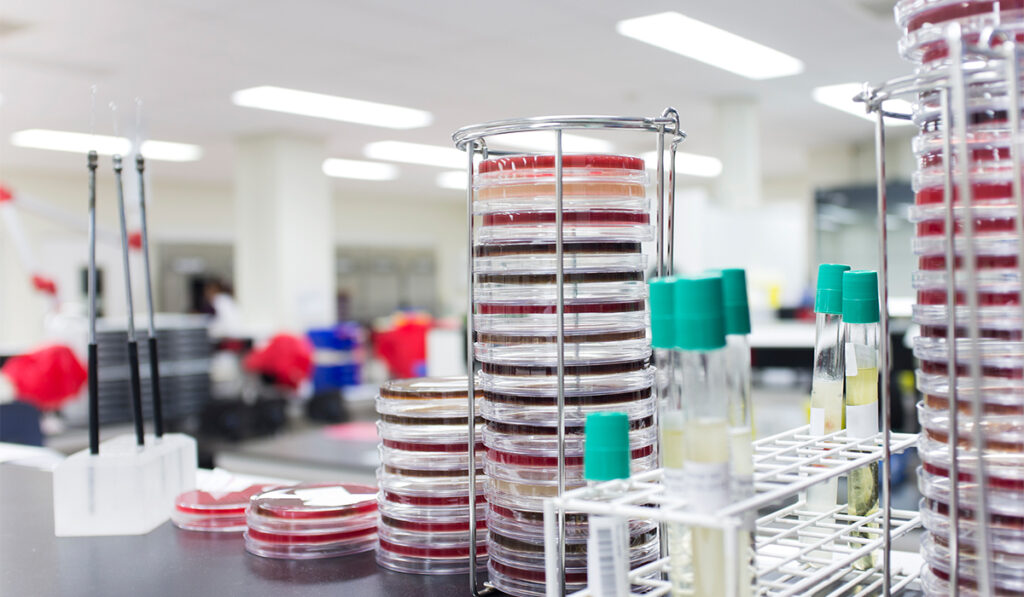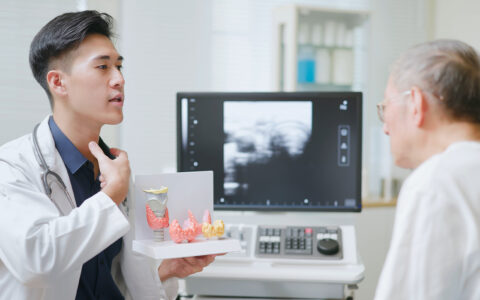The struggle between pathogens and the body’s protective gut microbiota plays a role in multiple health issues, such as food-borne illness, autoimmune disease, and cancer.
Researchers at Vanderbilt University Medical Center are examining the bacteria Salmonella and the ways it can turn the body’s own defenses to its own advantage.
Mariana Xavier Byndloss, Ph.D., an assistant professor of pathology, microbiology and immunology, has worked extensively in this area. Her recent studies involve propionate and aspartate, protective metabolites produced in the gut that may also, in certain circumstances, help the Salmonella pathogen grow.
“It’s been known for a while now that the gut microbiota plays a critical role in preventing Salmonella infection by producing metabolites, such as short-chain fatty acids, from the microbes digesting fiber in our diet,” Byndloss said. “One of them is propionate, which can prevent Salmonella growth by acidifying the pathogen’s cytoplasm. We are interested in understanding how Salmonella causes disease and how it can overcome these protective mechanisms.”
In the Body’s Defense
Salmonella can cause gastroenteritis and, in some cases, potentially fatal systemic illness. In the United States, sporadic outbreaks occur related mostly to food. However, some types of pets – such as reptiles and amphibians – can also transmit the pathogen. In Africa and other parts of the world, certain strains can cause systemic disease with fever, spleen damage and liver enlargement, while drug-resistant strains can be found worldwide, Byndloss says.
One way the pathogen flips the protective metabolites to its advantage is by inducing inflammation in the intestinal mucosa, changing the gut environment enough to outcompete the commensal microbiota.
Salmonella’s genes allow it to use propionate, but Byndloss’ team found those genes are not always active. In some cases, however, molecules from the host’s inflammatory response may cause the bacteria to switch its metabolism from fermentation to respiration, permitting uptake of propionate.
Byndloss and colleagues have also studied the possibility that propionate may regulate pathogen virulence, expressed through genes that cause inflammation.
During the stage when Salmonella cannot use propionate, the genes causing its virulence are amplified. Once it switches to respiration and propionate utilization, it down-regulates the virulence and invasion genes – to avoid killing the host.
“Our thinking is that this is a way for the pathogen to sense the stage of infection,” Byndloss said. “It switches away from inflammation to a stage of growth within the intestine in order to transmit to the next host.”
Evolution Changes Rules
Byndloss notes that it can be tempting to think of the pathogen as having the intention, along with the ability, to outmaneuver the body’s defenses.
“There is a selective pressure for them to adapt to this environment.”
“But it’s all evolution,” she explained. “Microorganisms evolve much faster than we do. They replicate every 30 minutes. The fittest cell survives. There is a selective pressure for them to adapt to this environment.”
This includes resistance to antibiotics.
The goal of the pathogen is not to kill the host, but to survive and proliferate until it gets to the next. To do that, it must evolve its genome.
The research team’s aspartate study involved a similar process. During inflammation, Salmonella causes the gut microbiota to release amino acids, including aspartate. Salmonella can use aspartate to fuel respiration to outcompete the microbiota. Salmonella induces the killing of commensal microbes with inflammation to access new nutrients that support pathogen growth.
Metabolomics Ahead
Byndloss envisions a time when a metabolomics profile is standard medical practice – an assessment of which microbes and metabolites are present or missing in the gut microbiota, with the aim of restoring the missing, beneficial ones.
Genetic predisposition as well as non-genetic factors can affect susceptibility to Salmonella: diet and exposure to antibiotics in early life can alter the development of the immune response and the gut microbiota. A single gene mutation or switching the diet from one type of protein to another can have significant effects, she says.
“We’re looking at choices,” Byndloss said. “Food, medication, life changes – all can affect our susceptibility to pathogens.”





